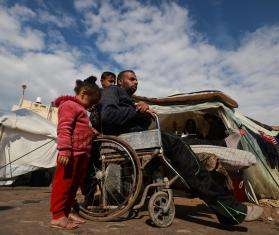A new service for testing and treatment of hepatitis C opened at the Arshakunyats Polyclinic in Yerevan, Armenia in early April, providing a one-stop-shop for the local community, free of charge.
The service is part of a project launched in 2023 by Doctors Without Borders/Médecins Sans Frontières (MSF), in close collaboration with the Arshakunyats Health Center, to provide access to testing and treatment of hepatitis C.
"In line with Armenia's national hepatitis C elimination goal and MSF medical action based on principles of medical ethics and impartiality, the dedicated unit is MSF's attempt to improve access to treatment for key populations," said Inga Sahakyan, a project coordinator with MSF, in reference to people who are infected or at risk of infection.
What is Hepatitis C?
- Hepatitis C is a viral infection that affects the liver that can be life-threatening.
- Symptoms can include fever, fatigue, loss of appetite, nausea, vomiting, abdominal pain, dark urine, and jaundice.
- An estimated 50 million people worldwide have chronic hepatitis C and there are about 1 million new infections per year.
- Approximately 242,000 people died globally from hepatitis C in 2022.
- There is no vaccine for hepatitis C, but it can be treated with antiviral medications. Early detection and treatment can prevent serious liver damage and improve long-term health.
The service aims to improve access to hepatitis C care for at-risk people in Armenia. The Joint United Nations Programme on HIV/AIDS defines this group of people as those who are at increased risk of HIV infection and other diseases such as hepatitis C. People in this group experience a greater prevalence of mental health issues and other health risks, while often enduring marginalization.
The service aims to improve access to hepatitis C care for at-risk people in Armenia. The Joint United Nations Programme on HIV/AIDS defines this group of people as those who are at increased risk of HIV infection and other diseases such as hepatitis C. People in this group experience a greater prevalence of mental health issues and other health risks, while often enduring marginalization.
Helping an underserved group
"In the negotiation stage of the project, we feared that the key population was not ready to seek medical care, but thanks to teamwork, we managed to identify and include people in difficult situations, treating and alleviating their burden while respecting medical ethics. Now I can proudly state that the project is well established and hepatitis C treatment is now available to the key population groups," said Armine Zohrabyan, deputy head of the health department of Yerevan municipality.
The project aims to help facilitate access to care and eventually help reach Armenia’s goal to eliminate hepatitis C nationwide. The World Health Organization raises the hepatitis C virus as a public health concern in Armenia.
Since the start of the project at Arshakunyats Health Center last year, 445 people have begun treatment and 113 have successfully completed treatment.
“Being a patient with this disease myself, I sought care and... I can't find words to describe the level of care with which they have received me, accommodated me, and examined me—with everything free of charge. Thank God, today I am maybe 99.9 percent cured. Thank you all," said Sevak, a former patient.

About our work in Armenia
MSF first worked in Armenia in 1988 to respond to medical needs following the Spitak earthquake. In the 30 years since, MSF has provided assistance to people in Armenia and Nagorno-Karabakh across different projects, including therapeutic care for children with disabilities and programs focusing on multidrug-resistant tuberculosis, among others. In January 2021, MSF started a mental health project in Nagorno-Karabakh after the outbreak of war in the region in 2020, and deployed psychological support teams in the city of Goris to provide psychological first aid to people displaced from Nagorno-Karabakh in September 2023.




